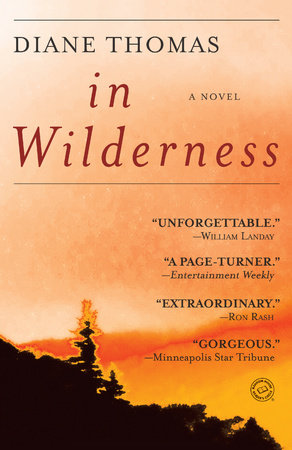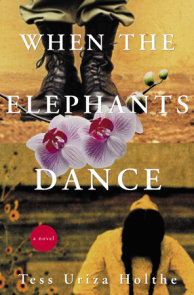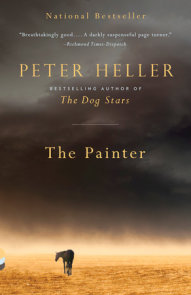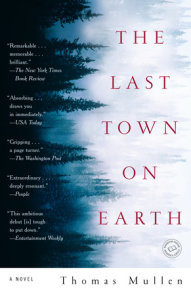READERS GUIDE
A Conversation Between Diane Thomas and Christina Baker KlineChristina Baker Kline: What inspired you to write In Wilderness?
Diane Thomas: The wild, unspoiled beauty of the north Georgia and North Carolina mountains in the 1960s inspired me. Back then they still held vast tracts of undeveloped land where a person might live virtually undisturbed. I wondered how an isolated existence in such a remote setting might affect people who were unused to it. Would they become more violent, more primitive? Or would they keep their civilized behaviors? Would the institution of selfless, romantic love, for example, unmask itself as something purely animal? Or would it survive?
CBK: You wrote your earlier version of In Wilderness (then called The Clearing) many years ago. How did it differ from the final book? What did you learn writing it that helped you write In Wilderness?
DT: The story that makes up In Wilderness happens in all the same places it did in The Clearing. The new manuscript also kept most of the same plot points. And yet the entire book is changed. The strength of Danny’s personality, so different from that of his earlier incarnation, changed all of Katherine’s interactions with him, and thus some aspects of her own personality. I also set In Wilderness further back in time (1966) than The Clearing, which takes place in 1973. Those few years—-encompassing the hippie era, the rise of feminism, and much of the Vietnam War—-made an enormous difference: The values and behaviors Katherine starts out with in In Wilderness were shaped by that earlier time. I was surprised how long it took me to rewrite—-perhaps longer than creating an entirely different novel would have. Actually, now that I think about it, that’s what I did: I created an entirely different novel.
CBK: Did the novel unfold as you expected it to? Did any scenes—-or plot points—-take you by surprise?
DT: The first version, The Clearing, came about primarily as a reaction to a period of extreme ill health; writing it enabled me to “escape” from my near–bedridden condition, and to distract myself from fears of dying. The ill health proved transient, and as no one took the manuscript, I set it aside and went back to my day job. When I returned to it thirty years later, I expected to find writing that was inferior but characters that held up. The opposite proved true, at least with the male character: The writing was good, but I did not find him engaging or believable.
The Danny of In Wilderness differs totally from his counterpart in The Clearing, who was a cultured, disaffected millionaire in his forties. In In Wilderness, he is a twenty–year–old mountain boy so traumatized by his experiences in Vietnam he has become almost feral. I made him the opposite of Katherine, the story’s protagonist, in every way. The only thing they have in common is that by the time they meet, they’ve both lost everyone and everything they ever loved. What surprised me most in this later version was how deeply I cared for this new male character. He was edgy, complex, perhaps the embodiment of evil. But in a strange way he was also an innocent. Time and again, I found tears running down my face as I wrote him.
CBK: You deal with some heavy subjects in this novel, from illness and loss to loneliness and healing. Did you draw on anything in your own life or family history as you crafted the story?
DT: In writing the first version, I was dealing with my aforementioned illness, which in itself was isolating. In what I later came to recognize as an attempted exorcism, I gave my symptoms to my manuscript’s protagonist and said, in effect, “Symptoms, be gone.” I also gave her my attitude regarding my illness: that one soldiers on as best as one can. All of this carried over from The Clearing to In Wilderness.
CBK: In Wilderness has a powerful sense of atmosphere. You lived in the South for most of your life. How did living there influence your sense of place? Did you ever live in a remote cabin, like Katherine and Danny?
DT: I’ve never thought of In Wilderness as a specifically “Southern” novel. Its story might have taken place in any large mountain wilderness in the latter 1960s. I instead see it as a “mountain” story. The mountain areas of the South differ markedly from the rest of the region: The land is too rugged to grow cotton, and thus historically few people owned slaves there. The inhabitants of the Southern mountains have always been fiercely independent; many of the South’s mountain counties were Union sympathizers in the Civil War.
Ever since I can remember, the southern Appalachians have held a deep and abiding fascination for me. I spent most of my life in Atlanta, and sometimes, when my work as a freelance business writer led me far into the city’s northern sprawl, I could see them, misty in the distance. Years ago, I was stranded in an Atlanta taxi during a flash flood with an old driver who’d been born and raised in those mountains. I asked him what that had been like, expecting a few idyllic recollections. Instead, he told me how, shortly before World War II, when he was five years old, a pretty little blond girl his same age was brutally raped by a neighbor. Fearing justice would not otherwise be done, the local people kidnapped the man, took him deep into the woods, and burned him at the stake. Every man, woman, and child from miles around was present, and before the burning each person was made to contribute at least one piece of wood to the pile. The taxi driver’s mother gave him a small branch, led him by the hand up to the stake, and told him to place it there. Then she took him down by the nearby river, where he could neither see nor hear what was about to happen, sat with him, and gave him a piece of cornbread. I had never known a people capable of carrying out such vengeance. They seemed the pure embodiment of myth and story.
I never lived in a remote cabin like Katherine. But the taxi driver’s narrative knocks around inside me still. As does a single childhood visit to my great-aunt Mattie, in her two–room cabin with its logs joined with wooden pegs. She lived in a place called Startown, and my child’s mind conjured stars spinning great Van Gogh whorls in a black sky. Not long after—-I think I was seven—-I wrote a poem about “a cozy cabin right among the pines.” Three decades later, I gave that cabin to Katherine. These days, when people ask me where I’m from, I say if home is where my stuff is, I’m from Santa Fe, but if home is where my heart is, I’m from the southern mountains. They and their people inform my writing even now. To my mind, that’s where my sense of place comes from and any atmosphere I might bring to it.
CBK: Throughout the novel, Danny woos Katherine by leaving her books. How did you choose those particular books? Were there any others you wanted to use in the novel, but didn’t?
DT: Despite his identification with Gatsby, whom he encountered in an English class during his one college semester, Danny tends to think of works of fiction as fascinating but pretty much interchangeable; without his friend and childhood mentor, Jimbo, he might not have read much of it at all. The bookshelves lining the walls in the library of his burned–out house, where Peyton Place might stand next to The Odyssey, reinforce this concept. Danny reads these books in the order they are shelved. He likes the randomness, the unexpectedness of it; to him it’s like life. He can’t get into E. M. Forster’s Room with a View, decides it might be better appreciated by a woman, and passes it along to Katherine when he leaves the peaches on her porch. The books mentioned in In Wilderness came up as I was writing. Sometimes they have significance, and sometimes, like life, they came up at random.
CBK: You are in your seventies. Do you think you write differently now than you did when you were younger? If so, in what way?
DT: I believe that, generally speaking, the older one gets, the longer one’s view becomes and the more context and authority one is able to bring to it. Also, there’s a greater sense of urgency: When you have something to say, you want to get it said, said right, and said immediately, because you never know if that chance will be your last. Yet at the same time I believe I now write closer to the bone, more to the point than ever.
CBK: Living alone, Katherine discovers a latent artistic ability. Are you a visual artist as well as a writer?
DT: I minored in art in college, which led me to realize what little talent I had for it. Several years later I became the film reviewer for The Atlanta Constitution, then that city’s morning newspaper, which was perhaps a way for my interest in things visual to express itself indirectly. I should note that each of my three novels, including the one in progress, began with a mental image. For The Year the Music Changed, it was a black female disc jockey inside a radio station control booth doing her show in the middle of the night; it ended up near the book’s conclusion. For In Wilderness, it was Katherine walking into the dull winter forest in her bright red coat, which was near that book’s beginning. My novel in progress, set in two different time periods, has somewhat of a two–pronged beginning, with an image from each era.
CBK: In Wilderness opens with a failed pregnancy and closes with a new life. What role do Katherine’s fertility issues have in her psychology and her development as a character? How does becoming a mother change her?
DT: I don’t have children of my own, but I’m very close to my stepson—-close enough to have some inkling of how fierce motherhood can make someone. When Katherine got pregnant the first time, she quit mourning for her lost love and “came back to herself in a fierce way,” to love and protect her child. That same energy remains a primary aspect of her character, and her protectiveness comes into play during her second pregnancy, with deep consequences.
CBK: Why did you leave the South and relocate to Santa Fe? How has living there shaped your writing?
DT: For several years, my husband and I actually did live in a lovely mountain community north of Atlanta. The last thing I wanted to do was leave it. But the area’s dampness and humidity caused me severe mold allergies, so we came West seeking drier air. I doubt I will ever presume to write about Santa Fe, the desert, or other aspects of New Mexico as any more than a place a character once lived in or is passing through. Though its history fascinates me, and I’ve made wonderful friends and have never seen such a nurturing environment for creativity, I know so little of this place compared to what I know of the southern Appalachians. I know that part of the country through my heritage, bones, DNA. My father’s people settled in view of Virginia’s Blue Ridge Mountains in the 1700s. My mother’s people came to western North Carolina around the same time.
When I left the South I was sixty–seven. With the exception of two school years in New York getting an MFA at Columbia University, I had lived entirely in the South since I was three. I love the South and always will, I can’t help it—-even though it seems a lot like loving a mother with borderline personality disorder: She’s beautiful, charming, generous, welcoming, and kind—-until she veers off without warning into something unimaginably ugly and dangerous. But you love her nonetheless, even though you can’t forgive her and often barely understand her—-she is, after all, your mother.
There’s a long tradition of writers leaving the South only to spend most of their remaining lives writing richly and insightfully about it. Willie Morris comes immediately to mind, as does Truman Capote. Leaving makes you realize you know things about the South you didn’t know you knew—-like how, even in winter, when the central heat stays on, your bedsheets are always just a little damp from the humidity; or how, failing thunder, you never know it’s going to rain until it falls on you, because you can’t see the weather in the distance for the trees; or how “y’all” might one day serve a vital purpose in the English language, which unlike, say, French or Spanish, does not have a plural for “you”—-and that these things matter.
CBK: When she’s living in Atlanta, Katherine is debilitated by her illness. Through solitude and nature she is able to heal. The mind–body connection seems important in transforming Katherine’s health. Can you say more about the connection between psychological and physical wellness?
DT: It’s true Katherine feels empowered by her wilderness existence in ways she did not in the city. She suffers from environmental illness, as do I, which was virtually unheard of in the sixties. It’s a physical condition, although many members of the medical profession have been slow to accept it as such since many times its symptoms can be neurological (dizziness, mental confusion, short–term memory loss, seizures). Its onset is often triggered by exposure to one or another chemical compound; in Katherine’s case, it’s a pesticide. Petrochemicals and artificial fragrances are generally the biggest offenders in environmental illness and, since Katherine’s wilderness environment contains neither, her strength improves from her first day in the forest, as does her mood. Gradually, she becomes less afraid—-of both her illness and her aloneness. Before long she plants a garden, a metaphor for becoming involved with her new surroundings and taking responsibility for her life there. Soon she realizes she’s getting better. She is becoming whole, physically and psychologically.
CBK: What are you working on now?
DT: On what I hope will be a novel in short stories. Part of it takes place in the early 1970s and part during the “Great Recession” that began in late 2008. Readers of In Wilderness’s epilogue will know where the new manuscript is mostly set. It’s still in its early first–draft stage, but two of its short stories are nearly complete and my excitement over them is absolutely shameful.
Questions and Topics for Discussion
1. We know why Katherine buys a gun before she goes into the wilderness to die. But why does she buy vegetable seeds? Is she simply angry, or is there another, deeper reason?
2. What does Katherine’s garden represent? What role does it play in the story?
3. Discuss Katherine’s relationship to the natural world. How does hers differ from Danny’s? In what scenes are these differences most clear?
4. Why is Katherine drawn to Danny, given their differences? Would they have been attracted to each other if they had met before they came to the wilderness?
5. In Wilderness is in part a book about two illnesses unrecognized in the latter 1960s, when the story takes place: multiple chemical sensitivity (also called environmental illness) and post–traumatic stress disorder (PTSD). What are people’s attitudes toward these conditions today? Do you believe some illnesses are still unrecognized? What happens to people who suffer from them? How can/do they find solutions?
6. Both Katherine and Danny were on their way to realizing the American Dream. What derailed them? What replaces the American Dream for them when they’re together in the forest?
7. Do you think Katherine becomes healed? If yes, what do you think heals her?
8. Do you believe Danny finds redemption?
9. Near the book’s end, Katherine ventures into the heart of the forest. What do you think draws her there? What do you think she finds there? Where does she end up at the chapter’s end, and why?
10. Some researchers, analyzing cave drawings and other ancient data, believe humans and animals were once able as a matter of course to hear “the music of the spheres”—-humming sounds emitted by rocks, trees, animals, and other humans—-but that humans at least have lost this ability. Do you believe such sounds might have once existed? Might they still exist? If yes, why can’t we hear them today?
11. In the epilogue, do you believe Katherine has found peace and psychological health, or has she simply become a somewhat mentally disturbed hermit? What about her child? What kind of person do you imagine her child will grow up to become?
12. What has Katherine’s pristine forest become? Why did she leave? Should she have stood her ground? People came from cities to live in the community of Bartram’s Mountains: what are their attitudes toward the forest that surrounds them? Might the presence of the forest change these attitudes in any way? How?






















